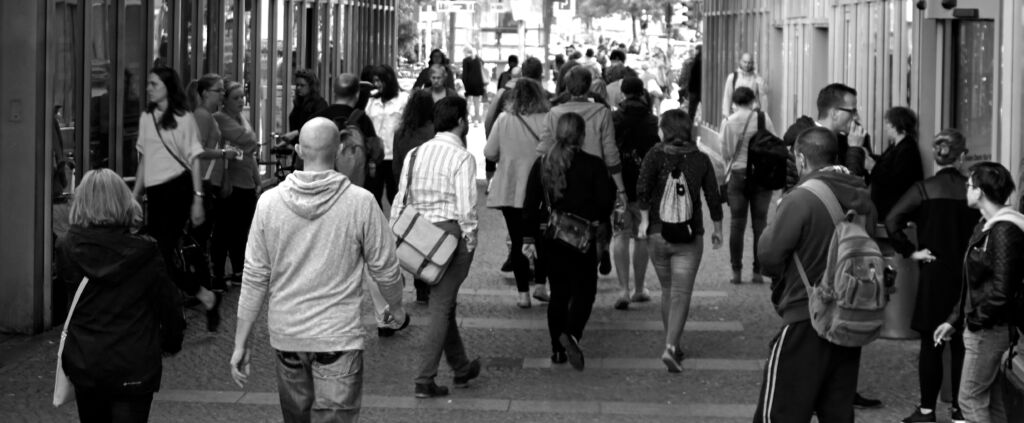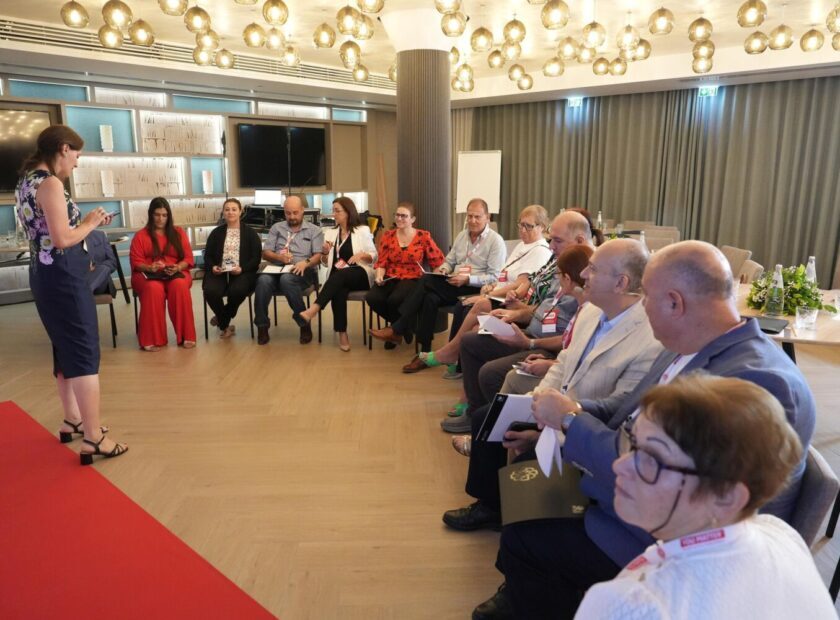
Six ways to change the perception of residents towards local government
The average resident often feels intimidated by the idea of interacting with the government, especially the local government. This sense of ‘intimidation’ can stem from various factors, including previous experiences, the persistent stereotype of ‘bureaucracy’, unmet expectations, differing political views, culture, habits, etc. Regardless of the reasoning behind it, however, any type of negative perception can prevent residents from becoming more engaged in their locality, which in turn can lead to a greater distance between government or council officials and the elected representatives themselves. This was evident in the last local elections where there was a significant decrease in the number of residents who felt they should participate in this democratic exercise.
Fortunately, local governments are uniquely positioned to overcome these potentially harmful misconceptions and change the way residents perceive both the people and processes behind governmental bodies, especially their local councils and how they operate within the community.
Let’s remember that our purpose is to serve.
Working in a service-oriented field – and this is the role of every level of government, including local – is a very demanding job. When people call you, they are generally seeking to ask for something or to complain. That is why it is important to remember that the phone call or letter is not personal, but rather a plea from a resident who voted for you to represent them. Remember, if a resident takes the trouble to call you or send you correspondence, it is because they still have hope that you can change what is bothering them.
We must recognize that when someone picks up the phone to call, it’s not to ruin our day. They’re calling because the pothole hasn’t been fixed, their street hasn’t been cleaned in a while, or a streetlight has been out for weeks. Perhaps they’re reporting a slippery sidewalk where someone could get hurt, hoping we can address the issue. Understanding this helps us respond with empathy and effectiveness, working together to resolve community concerns and improve everyone’s quality of life.
We must remember that a crucial aspect of working in local government is to address the needs of residents with empathy. After all, those elected are often part of the community, living in the same locality where they ran for office. Responding to questions, phone calls, and emails with patience and understanding can significantly change how people perceive local government.
One cannot expect people to fully grasp the systems we have implemented.
We must avoid making assumptions or pretending that everyone is familiar with the systems we use or understands the concepts behind them.
The systems and processes of local government can often seem like a language of their own. Therefore, it is crucial to find appropriate methods and platforms to maintain clear communication that everyone can understand. We need to explain why a system works the way it does and highlight the potential benefits it can bring. Failing to do so risks leaving people in the dark and fostering a less effective form of leadership, which can also increase the distance between councillors and residents.
We need to understand that residents often expect quicker and more effective solutions when they complain or write to someone they have personally voted for at the local level. While this expectation is not always realistic, it is important for us to explain.
We need to be able to delegate as well. A resident shouldn’t have to wait a week or more for a response just because one is traveling or is unavailable for a few days. We should trust our colleagues by passing on the complaint and communicating the type of response that should be given or the steps and actions that need to be taken.
Residents may not always be aware of the information they lack. Consequently, without someone to inform and provide feedback on ongoing developments, they might perceive that nothing significant is happening. This lack of communication can lead to a distorted perception and misunderstandings about the actual events unfolding in their community. Therefore, proactive communication and transparency are essential to ensure that residents are well-informed and have a clear understanding of the progress and initiatives taking place.
At times, procedures that may seem bureaucratic are essential for delivering improved services. As representatives of the local government, it’s our role to clarify the reasons behind these processes, enabling better understanding among the public. Often, fostering effective communication requires us to approach people with increased patience and empathy, ensuring their concerns are heard and addressed appropriately.
Providing genuine support to the youth in our community
Another important way for local governments to start projecting a positive image to the community is by actively engaging the interest and trust of young residents. This means implementing programs that go beyond words to truly involve the community’s youth in practice.
The perspectives of today’s youth will profoundly influence how future generations perceive our towns and communities. It is crucial for our councilors and employees to actively listen and engage with young people. By involving both current and future generations, we not only ensure their voices are heard but also invest in the strength and unity of our community. This proactive approach fosters a sense of belonging and responsibility among all residents, laying a solid foundation for a vibrant and inclusive community for years to come.
We act on diversity, equity, and inclusion
Recent events across Europe, including the European Parliament elections, have underscored the imperative for local governments to move beyond mere rhetoric on diversity, equity, and inclusion and take decisive action. Consistently feeling underserved, underrepresented, or mistreated will inevitably breed negative perceptions within community populations. Thus, proactive steps by local authorities are crucial not only to address these issues but also to foster a more inclusive and supportive environment for all residents.
The first thing local governments can do is foster better and more transparent communication on the subject. Our country has occasionally experienced “racial” incidents, and when this happens, we talk about the need to take measures, act, etc. A few weeks go by, and we forget everything. These are not issues we can address only with emotions. We need to bring together community leaders from different segments, leaders of different faiths (if necessary), people who were or still are activists, different ages, different genders, different racial backgrounds, different ethnicities, for an open discussion on how the community moves forward together. Let’s remember, not every individual residing in our locality is a citizen, but they are all residents, and as Mayors and Councillors, we represent the entire community.
The goal should be to bring these different groups together to provide the community with facts that they can share within their own groups, where they have already established trust. We may not solve all the problems, but we can promote the understanding of facts as opposed to conjecture and perceptions. This is a value that every local leader should believe in and work towards.
To help residents understand the council’s budget, we should focus on communicating its value, not just the figures in euros and cents
The council’s budget is a very typical topic. In fact, it is one of those things that residents tend to write about the most when things go wrong. Why? Because people often want money for projects, or they believe you should be saving money through certain actions. When they don’t get what they want, they view the decision as either baseless, politically motivated, or personally affronted by some personal vendetta. Residents simply do not understand the workings of the town or city’s budget.
But how can you get people interested in your budget? It’s a necessary component. You may have all the good ideas in the world, but if there’s no money to pay for them, it’s not going to happen. That’s why having a strong and healthy discussion about how to allocate your resources is crucial for a successful and inclusive community. The problem is that many residents do not have a financial background, so they either hold back from showing interest or we ourselves assume that they have no interest in knowing. This makes it difficult to get them involved in the subject.
Absolutely, empowering local governments to take proactive steps in educating residents and crafting budgets that truly address their needs is crucial. When councils foster discussions on spending priorities with residents, it sparks significant changes. While councils ultimately retain decision-making authority, allowing residents to influence how funds are allocated for specific projects adds immense value.
For example, when a council earmarks funds for a project and invites residents to determine the project’s nature and execution, it enhances community involvement and cohesion. Such actions not only democratize decision-making but also strengthen community bonds by ensuring that local initiatives reflect the collective aspirations and priorities of residents. Thus, initiatives like these undoubtedly contribute substantial value to the community, fostering a sense of ownership and collaboration that is vital for sustainable development and harmonious living.
Should these ‘roadshows’ be conducted locally, providing residents from different areas with the opportunity to genuinely participate in the decision-making process and feel included?
I come to ask; should the council’s budget be made within the four walls of the office or out on our streets with the people? When the council sits down with the people to draft the budget, the budget gets allocated according to what the people want. And it wouldn’t just be a set of numbers. It would be a document written with a narrative. Of course, priority must be given to contractual expenses that must be paid necessarily.
Cherishing our towns and cities
The author Peter Kageyama wrote a book titled “For the Love of Cities,” which I highly recommend for anyone involved in local government. The book discusses how people generally form their opinions about where they live based on small things, not necessarily the big ones, but the aspects that make their communities unique. These are the things that touch them personally and make a difference in their lives. Often, what makes a difference are small things, like how easily I can get in and out of my garage, whether I can hang laundry on the roof without it getting dusty from an uncontrolled construction site nearby, or if I have access to online services.
Therefore, it is crucial for council officials and elected members of towns and villages to actively nurture and promote this kind of affection and sense of belonging among their residents.
Social media and community council or resident technology forums provide excellent platforms to perpetuate positive messages about the little things that inspire people in your community. For example, when a new café or restaurant opens, visiting the establishment and sharing your experience can promote local businesses and foster their growth. These actions not only support local economy but also strengthen community bonds and pride.
More importantly, we need to commend residents who do the same. We should highlight small acts of kindness or experiences related to local associations or clubs, secondary schools, or community group meetings.
The local government sets the rules and provides the structural foundation for our communities, but it is the residents who bring these communities to life. It is their pursuit of passions and engagement in local activities that transform a city into a beloved home. Thus, any measures the local government can take to support and encourage these efforts will result in the most significant achievements, fostering greater resident participation and strengthening trust in local governance.
In conclusion…
If your residents’ perception of the local government is less than ideal, don’t lose hope. There are many ways you can work to change both hearts and minds. The key to fostering a more optimistic view among your city’s workers and residents lies in maintaining open communication, continuing to work diligently, and ensuring that all residents feel heard by their representatives.
Implementing prompt measures to bolster the standing of your local council can significantly enhance the productivity of your staff and elected officials, while also ensuring that every interaction becomes more streamlined and effective.

The fundamental principle we must grasp is that we are here to serve.

Inclusivity is crucial to truly change residents’ perceptions

Consultation with our residents is imperative to ensure they feel part of the decisions being made at the local level.

Young people are not only the future of today and tomorrow, but they are also important assets in shaping local democracy and their involvement helps build a generation with greater confidence in Local Government.
Mario Fava
President



